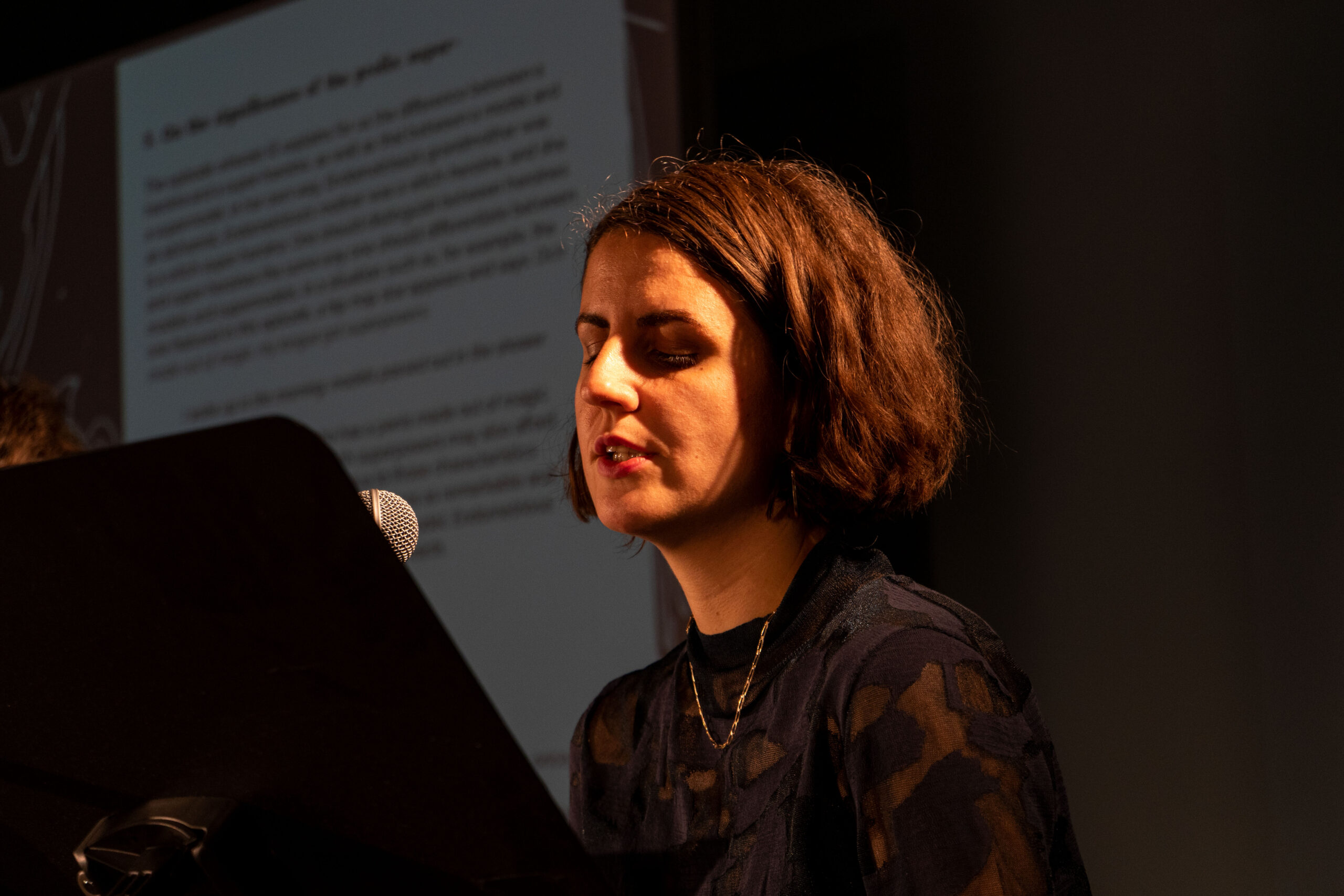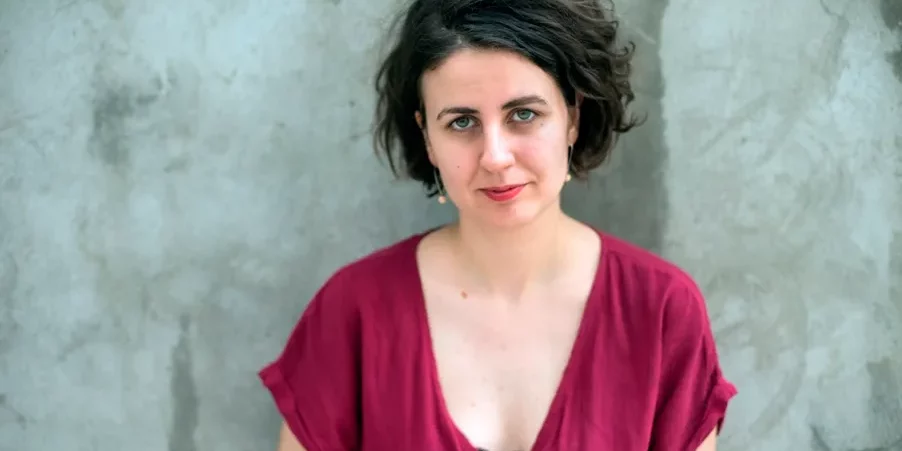Tanja Šljivar is a playwright and dramaturg whose work has been produced across Europe She talks to Darija Davidović about her new play about teenage pregnancy, her upbringing in Banja Luka and writing her debut novel about her time at the National Theatre Belgrade
Darija Davidović: In October, your play All adventurous women do will have its premiere at Belgrade’s Atelje 212, in a production directed by Selma Spahić. The play explores teenage pregnancy. What drew you to this topic?
Tanja Šljivar: I came to this topic after reading several articles about the case of the ‘collective pregnancy’ of seven small-town Bosnian 13-year-old girls. The lines between fiction and reality are porous and during my research, it was impossible to detect what had taken place and where and how, so the text echoes a lot of that uncertainty about the total and/or objective truth, factuality, or reality.
On the other hand, by choosing to let the fictional seven girls speak in seven monologues, I wanted to put them in charge of their own stories, of their own narratives and framing of the reality in which this might have happened. Some of the topics I explore in the piece are: female friendship, how the language of the youth is shaped by different agents: internet, their parents, and possibly critical theory, which actually shaped my language. Apart from that I tried to explore how different oppressive systems such as school, church, medical system, families, construct their bodies, lives, values and rebellion.
Darija Davidović: You were born and raised in Banja Luka and some of your plays, such as How much is Pate (2012) or Scratching, or: How My Grandmother Killed Herself (2012), are set in this region. What was it like to grew up in this city during the 1990s? Beside the war and the extreme social and economic changes of the period, did the local theatre scene also influence your work?
Tanja Šljivar: The city and the primary school were, to put it very mildly – harsh. It was a time when we, the children, took for granted, or for given, a lot of deprivation: emotional, intellectual and also deprivation of our very basic needs. I think I just somehow intuitively understood that I needed to survive primary school and maybe something will happen afterward. Then, the secondary school was OK, it was in great part the nurturing surroundings where I could try exploring my own interests and creative potential, and yes, the local scene definitely did influence me, especially at the time when it was the only scene, I could participate in. I think that many of the experiences from the time when I lived in Banja Luka have deeply shaped me, as anyone else, simply by the fact that it was the childhood and adolescence which periods in the life of human individuals where the shock and excitement of being alive exist simultaneously. The sounds of the dialects, visiting the countryside with my grandmother, the humor and desperation constantly mixing in the very same statement are still part of me in a way, and some of the customs of living I was socialized into, I still dwell among.
Darija Davidović: What does theatre mean to you and why drew you to theater in the first place?
Tanja Šljivar: I used to go both to the theater and movie theater in Banja Luka, with my parents, friends, or alone, I was also always very excited and avid visitor of theater and film festivals and I also started writing short fiction as a teenager. Since there was not much to do, and I had a lot of energy, I was basically pouring my creativity into many things – such as language courses, playing guitar, hanging out in parks and drinking, and trying to get any visa to travel anywhere, doing volunteer work and then it all just spill primarily into writing for the theater. Had there been creative writing graduate schools, apart from scenic writing/scriptwriting/dramaturgy at the Faculty of dramatic arts in Belgrade, I might have been at a different place now, maybe writing novels and prose, however, I did get into collaborative writing, dramaturgical thinking, exploration of different modes of presentation of the text, and interest for representation as a broader political and aesthetic question through my dedication and work in the theater.

Tanja Šljivar
Darija Davidović: In your plays you deal with topics such as war, nationalism, patriarchy and working conditions in a capitalist system. Do these topics also influence the way you work?
Tanja Šljivar: They most certainly do. Right now, I juggle between several university positions, while still formally having the status of a freelance artist. I still apply for residencies although it is unclear how to attend them, since I work at the University. At the same time, I want to write my novel, which is a project I apply with for residencies, where I always end up working for others, in several different media and formats, since I find their project artistically compelling and I seemingly do not mind exploiting myself in the name of art/work. On top of it I am in my 30s – where my previous life choices are hitting hard – where I believed in my early 20s that my legacy would and could be my texts, now societal, familial and my own expectations threaten to explode in my womb, shoulders, neck, blood vessels and head.
Darija Davidović: In many of your dramas, the protagonists are children. What fascinates you about the characters and perspectives of children?
Tanja Šljivar: I guess that it had to do with my own age at the time of writing of those texts, for one thing, and also I felt that the figure of the child is a theatrically potent one. On the one hand, back then, I had only disposed of my own scarce life experience of growing up, and so it was a common decision of the up-and-coming young artist to deal with her own youth in her first works. I was a big fan of the coming-of-age movies of the 90s, such as Kids by Larry Clark and I am a big admirer of the director Celine Sciamma. Her latest work Petite Maman is a fascinating study of dealing with loss in childhood. Apart from that language, semantics, construction of sentences, and discourse analysis remain one of my primary interests as a writer, so I feel that especially the language of children, the exclusionary slang of the young, are exciting fields for artistic research and writing texts for theater.
Darija Davidović: Your play Regime of Love (2019) deals with the topic of different forms of love and the increase of a neoliberal love market. What fascinated you about this topic? And why did you choose this form of socio-critical comedy to deal with it?
Tanja Šljivar: This play was commissioned by Atelje 212, and what they actually commissioned was a comedy. Humour is something I kind of inherited from my family, my surroundings and also my upbringing during those traumatic times. Sometimes it is even an inappropriate answer to the injustice, and brutality of reality and sometimes I need to explain myself to others in that regard – but it seems that laughter and making jokes are my natural responses to the absurdity of the world torn by inequalities and exploitation.
On the other hand, as I was commissioned to write a comedy, I also felt the political responsibility towards the other, deeper inequalities – first and foremost economic ones, so I decided that the only topic that deserves public laughter is the contemporary love market. My colleague Dimitrije Kokanov [dramaturg at Atelje 212] claims (in what appears to be a good joke) that I am a ‘true’ descendant of a Serbian (male) comedic tradition of Sterija, Nušić, Kovačević etc. So, in the case of love and romantic comedy, I could also paraphrase Schopenhauer, when he claims that humour comes as a consequence of a sudden perception of the discrepancy between concepts and real objects – what we conceptualize as love as a culture and what we actually experience is what also makes us laugh (and cry).
Darija Davidović: From 2019 to 2020, you worked as an artistic director at the National Theatre in Belgrade. Now, you are writing a novel about your experiences in this high position. What has motivated you to write a novel on this topic?
Tanja Šljivar: I have a feeling that many people would like to know ‘how things work’ or ‘how is art produced’, or ‘how is non-art turned into art in art institutions’. In the same manner in which I can enjoy the story of CERN researchers or information on molecular biology or podcasts on space, I think that there could be a broader general public interest in what happens ‘behind the curtains’. My work as an artistic director at the National Theater, when I was 30, has been a radical experience in many terms, also a darkly comic one, so I also have a deep personal need to deal with it in a lengthy format and time and to protect myself from it by allowing myself to frame a narrative around it. I also was not particularly interested to write ‘play within a play’ or a theater text that took place in the theater, so I felt that it was high time, by my mid-30ss I started writing this longer, and lonelier form – my debut novel.

Željko Makssimović amd Aleksandar Đinđić in Dr Auslender. Photo: Jelena Janković
Darija Davidović: As a dramaturg, you recently worked on the project Dr. Ausländer (Made for Germany), which premiered at BITEF this year. The play deals with the mass exodus of Serbian medical doctors and other health workers to Germany in search of a better life and working conditions. Do you see any parallels to cultural workers/artists from Serbia, who have also left the country?
Tanja Šljivar: Yes, the opening scene in the piece is in the German language and the first topic we hear about is German theater. There is a long list of all the authors from the German-speaking countries who presented their work in the course of more than 50 years of the BITEF festival. ‘Dr. Ausländer’ is in many ways a performance on the topic of domination: by the capital, by imposing economic and political power, through borders and institutions of the neo-liberal economy of one country to another. Both the contemporary art market and medical systems of Western countries are ready to suck in artists and medical workers whenever we are ready or forced to work, to sell our work force abroad.
On the other hand, as John Berger writes in his beautiful, sad and important book A Seventh Man, which is also a quote we use in the performance: “Migration involves the transfer of a valuable economic resource – human labor – from the poor to the rich countries. The workers who migrate may have been unemployed in the country of origin, but this does not alter the fact that the community has invested considerable sums in their upbringing. It has been estimated that the upbringing, the price of survival till the age of twenty of a migrant, has cost the national economy of his own country about £2,000. With each migrant who arrives, an under developed economy is subsidizing a developed one to that amount.(…)The use of labor, already produced elsewhere, means an annual saving for the metropolitan countries of £8,000 million.’’
So, apart from noticing the appalling growth of globalized economies and costs of living in Europe and worldwide (the book was first published in 1975), we see the trajectory that can be followed since the ending of the Second World War regarding the lives of migrant workers, with minding all the individual and group differences: be it Gastarbeiter, medical workers or contemporary artistic precariat generation.
Darija Davidović: How did the pandemic impact the Serbian theater scene? Also what effect did the #nisamprijavila (I did not report) movement have on theatre culture? What, if anything, has changed?
Tanja Šljivar: I think it is still difficult to say, and that not enough surveys have been made on either of the topics. The pandemic has shown that the minimum monthly wage given to freelance artists is not an impossible goal, the pandemic has also shown that we are all suffering from creation compulsion – everyone was in an instant ready to produce performative content for online platforms. As for the cases of sexual misconduct and abuse, both in theater schools and theater houses – what is clear is that female voices will no longer be silenced. What is disappointing is that the legislative system and to a certain extent also public opinion are still very hard to bend.
Main image: Marija Jankovic
For tickets and further information, visit; atelje212.rs
Further reading; Dr Auslander (Made for Germany): Documenting migrant stories
Dr. Darija Davidović is based in Bern, Switzerland and Vienna, Austria. She is currently a postdoctoral fellow in the research project “Aestheticisation of war violence in contemporary performing Arts” at the Institute of Practices and Theories in the Arts, Bern Academy of the Arts. She obtained her doctoral degree from the University of Vienna, Department of Theatre, Film and Media Studies with her theses “Contested Wartime Past(s): practicing politics of history in Serbian and Croatian Contemporary Theater”, which will be published in 2024. She has been involved as activist in many feminist and antifascist projects and campaigns in Germany and Austria.








